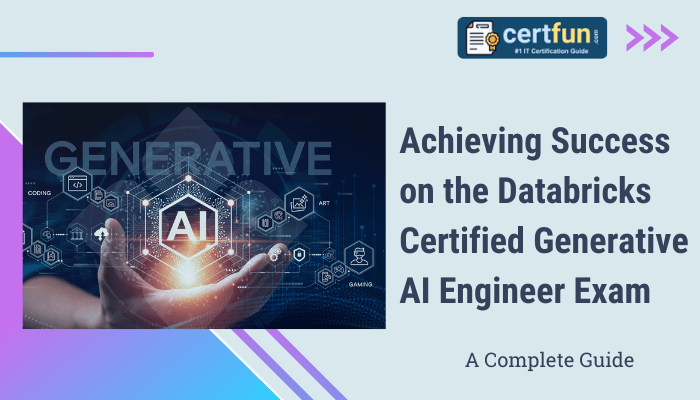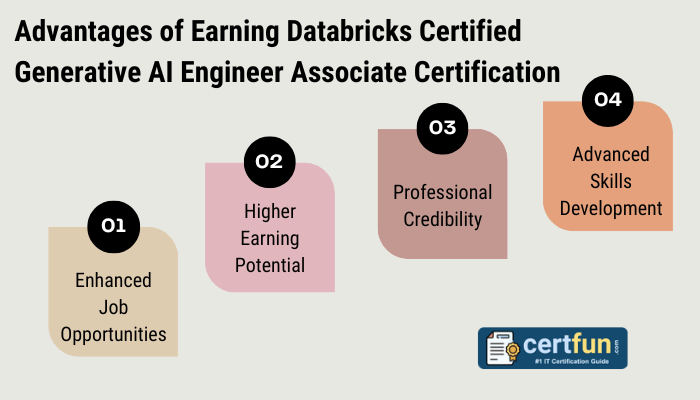
Designing and implementing large language model (LLM)-enabled solutions has become a key skill in modern AI engineering, particularly with Databricks’ advanced tools and frameworks. For those looking to validate their expertise, the Databricks Certified Generative AI Engineer Associate Exam is the gold standard. This certification not only demonstrates proficiency in using Databricks’ LLM solutions but also serves as a testament to your skills in generative AI development. With high-stakes exams like these, a well-structured approach to preparation is essential.
In this guide, we’ll break down the key elements of the exam, preparation strategies, benefits, and career opportunities that the Databricks Certified Generative AI Engineer Associate certification can bring. Whether you’re new to Databricks or aiming to solidify your expertise, this article provides the foundational knowledge and resources to help you excel.
What Is the Databricks Certified Generative AI Engineer Associate Exam?
The Databricks Certified Generative AI Engineer Associate Exam is designed to validate skills in leveraging Databricks for generative AI applications. It assesses a candidate’s ability to develop, optimize, and deploy AI models in Databricks, focusing on generative AI workflows and solutions. With a focus on hands-on skills, this exam ensures that certified professionals can design effective, scalable LLM solutions that address complex AI challenges.
Candidates are tested on several key domains, including data preprocessing, model selection, fine-tuning, and real-time AI solution deployment. Achieving this certification signals an advanced level of technical knowledge in Databricks and establishes you as a trusted professional in the field of generative AI.
Exam Objectives and Structure
Understanding the exam structure and objectives is crucial for efficient preparation. Here’s a breakdown:
-
Design Applications (14%)
-
Data Preparation (14%)
-
Application Development (30%)
-
Assembling and Deploying Apps (22%)
-
Governance (8%)
-
Evaluation and Monitoring (12%)
Exam Strucutre
-
Total number of questions: The exam consists of 45 multiple-choice questions that assess your knowledge and skills.
-
Type: This is a proctored certification exam, ensuring a secure and monitored testing environment.
-
Time limit: Candidates are given 90 minutes to complete the exam, so efficient time management is key.
-
Registration fee: The cost to register for the exam is $200.
-
Question types: All questions are multiple-choice, testing both theoretical knowledge and practical application.
-
Test aides: No external aids or materials are allowed during the exam, requiring thorough preparation.
-
Languages: The exam is available in English, Japanese (日本語), Brazilian Portuguese (Português BR), and Korean (한국어) to support global accessibility.
-
Delivery method: The exam is conducted online with proctoring to ensure compliance with testing standards.
-
Prerequisites: No prerequisites are required, but related training is highly recommended for better performance.
-
Recommended experience: Six or more months of practical experience with generative AI solutions is advised to succeed in the exam.
-
Validity period: The certification is valid for two years, after which recertification is required.
-
Recertification: To maintain certified status, candidates must retake the latest exam version every two years, following the “Getting Ready for the Exam” guide to prepare.
Ways to Prepare for the Databricks Certified Generative AI Engineer Associate Exam
Preparing for the Databricks Certified Generative AI Engineer Associate Exam requires a comprehensive approach that combines official resources, hands-on practice, and structured study methods. Here are key strategies to ensure you are fully equipped for the exam:
1. Review the Official Exam Guide
Start by exploring the official Databricks certification page, which provides an outline of the exam's content and objectives. This guide is the foundation of your study plan and helps you understand what topics are essential and what areas require the most attention.
-
Understand Exam Domains: The guide divides the content into specific domains, such as data preprocessing, model fine-tuning, and deployment of AI solutions. Each domain is crucial for passing the exam, so pay attention to the emphasis on each.
-
Identify Core Skills: Knowing the required skills for each section allows you to evaluate your strengths and weaknesses, ensuring you focus on areas needing improvement.
-
Exam Format Familiarity: Reviewing the guide helps you get comfortable with the question formats and the balance between theoretical and practical components.
2. Study the Exam Syllabus
The CertFun exam syllabus provides a detailed outline of the topics that will be covered in the exam. This document serves as a roadmap for your preparation, ensuring no key area is overlooked.
-
Detailed Topic Breakdown: The syllabus categorizes each topic, helping you focus on individual concepts like LLM frameworks, data preprocessing methods, and model optimization techniques.
-
Learning Objectives: Each topic area comes with specific objectives, which clarify what you should be able to do within each domain. Aligning your studies with these objectives boosts your confidence and preparedness.
-
Tracking Progress: Use the syllabus as a checklist to monitor your understanding of each section, marking off topics as you gain confidence in them.
3. Practice with Mock Exams and Sample Questions
Familiarizing yourself with the exam’s format and timing is crucial. Sample questions and mock exams from CertFun provide an accurate representation of what to expect on test day.
-
Simulate Exam Conditions: By practicing in timed sessions, you can improve your time management skills and build stamina for the actual exam.
-
Identify Knowledge Gaps: Mock exams help reveal areas where you may need to focus more, allowing you to prioritize your studies.
-
Refine Answer Strategies: Familiarity with question formats allows you to strategize your approach, including how to quickly identify the correct answers and manage complex questions efficiently.
4. Gain Hands-On Experience in Databricks
Practical experience with Databricks is essential for success. This platform’s cloud-based environment allows you to implement real-world solutions and gain experience with the tools covered in the exam.
-
Set Up LLM Models: Practice setting up, fine-tuning, and deploying large language models, as this is a core component of the certification.
-
Preprocess Datasets: Gain experience in data preprocessing, which includes cleaning, transforming, and preparing data for model training and deployment.
-
Deploy AI Solutions: Familiarize yourself with deploying generative AI models in a scalable environment, which is a crucial skill for the exam.
5. Take Structured Online Courses
Enrolling in online courses the Databricks Learning Academy is a structured way to deepen your understanding. These courses are tailored to cover generative AI principles and Databricks tools that are directly relevant to the certification exam.
-
Comprehensive Curriculum: Many courses offer a curriculum that aligns with exam requirements, including both foundational concepts and advanced applications.
-
Hands-On Projects: Courses often include practical projects, allowing you to apply what you’ve learned in real scenarios, which is especially valuable for skill-building.
-
Expert Instruction: Learning from certified instructors or industry experts can help clarify difficult concepts, providing valuable insights that may not be available through self-study.
Perks of Earning the Databricks Certified Generative AI Engineer Associate Certification
The Databricks Certified Generative AI Engineer Associate certification offers several valuable benefits that can significantly enhance your career and professional development. Here are some of the main advantages:

1. Enhanced Job Opportunities
In today’s rapidly evolving tech landscape, AI engineering has become a highly sought-after skill. Companies across various industries are actively looking for professionals who are proficient in Databricks to drive their AI initiatives. Earning this certification can expand your career prospects, positioning you as a top candidate for specialized AI roles.
-
In-Demand Roles: This certification can qualify you for various roles, including AI Engineer, Data Scientist, and AI Solution Architect. These positions require advanced AI skills and a deep understanding of Databricks, making certified professionals ideal candidates.
-
Industry Recognition: With this certification, your resume stands out to recruiters who prioritize candidates with recognized credentials.
-
Competitive Advantage: In a competitive job market, this certification can set you apart from other candidates, especially as companies increasingly seek employees with verified AI and Databricks expertise.
2. Higher Earning Potential
One of the primary advantages of certification is its positive impact on earning potential. Professionals with advanced AI certifications are often compensated at higher levels due to the specialized skills they bring.
-
Increased Salary Prospects: Certified AI engineers typically have access to higher-paying roles compared to their non-certified peers.
-
Value-Driven Compensation: Employers recognize the rigorous preparation and expertise needed to pass the certification, justifying a higher pay scale for certified professionals.
-
Opportunity for Promotion: Holding a certification can also lead to career advancement, as it shows your commitment to professional growth and expertise, potentially qualifying you for senior-level positions and salary increases.
3. Professional Credibility
Certification from Databricks is widely recognized in the AI and data science industries, and it can greatly enhance your professional credibility. Employers, clients, and peers respect certified professionals for their commitment to quality and knowledge.
-
Trusted Expertise: Being certified by Databricks shows that you have met their rigorous standards, making you a trusted resource in the AI field.
-
Recognition Among Peers: This certification can establish you as an expert within the AI and data science communities, helping you build a network of professionals who respect and value your expertise.
-
Foundation for Further Learning: With a certification that highlights advanced skills, you may be more easily considered for additional training or certification opportunities within your organization.
4. Advanced Skills Development
Preparing for the certification exam not only helps you validate your knowledge but also encourages you to expand and deepen your expertise in Databricks and generative AI. Through the exam preparation process, you’ll gain new technical skills that are highly applicable in real-world scenarios.
-
Master Databricks Best Practices: By studying for the certification, you become well-versed in best practices for using Databricks, from data preprocessing to model deployment.
-
Practical Skills Acquisition: The hands-on nature of the exam means that you’ll be able to implement AI solutions efficiently and effectively, which is a valuable skill in any AI-related role.
-
Staying Current with AI Developments: The certification keeps you updated with the latest trends and techniques in AI engineering, helping you remain a relevant and valuable asset in a field that is constantly advancing.
Career Prospects for Databricks Certified Generative AI Engineer Associates
With the growing demand for generative AI applications, those certified as Databricks Generative AI Engineers have access to various career paths, including:
-
AI Solution Architect: Specializing in AI model development and deployment on scalable infrastructures.
-
Data Scientist: Using Databricks to analyze data and deploy LLMs to generate insights.
-
AI Engineer: Building and optimizing generative AI models for use in business applications.
-
ML Ops Engineer: Focused on managing the lifecycle of AI models, including monitoring and scaling deployed solutions.
Many companies value Databricks-certified professionals for their proven skills in handling AI challenges, which directly impacts productivity and innovation.
Conclusion
Earning the Databricks Certified Generative AI Engineer Associate certification can be a game-changer for those pursuing a career in AI. The certification proves your ability to work with large language models, develop generative solutions, and apply Databricks tools effectively. As companies increasingly adopt AI-driven strategies, certified professionals are well-positioned for advancement and new opportunities.
For further resources and practice exams, check out CertFun’s Databricks certification offerings, and start preparing for success. With focused effort, the right resources, and practical experience, you’ll be on track to acing the Databricks Certified Generative AI Engineer Associate Exam.
